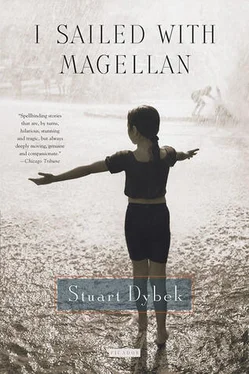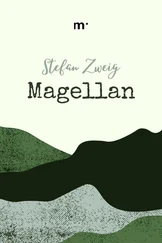At the end of each day at St. Roman, classes would be released in order of seniority, so Chester would have to wait for Ralphie’s class to let out. He’d wait for Ralphie on the corner by the church. If it was raining, he’d have an umbrella already opened. Chester was the only boy at school with something as sissyish as an umbrella. At least it was a black umbrella. Then, he and his brother, Ralphie, walked home down Washtenaw together, engaged in their secret conversations.
Once, the spring after Ralphie died, I was released early from detention because the April afternoon was darkened by the total eclipse of a thunderstorm. The corridors were empty, all the classes had already fled home. Outside, I noticed from a half block away that Chester stood on the corner waiting with an open umbrella. He must have stayed to watch the younger kids file out. And he was still there waiting after they’d gone. Although I saw Chester in school every day, I really hadn’t talked to him since Ralphie died. We’d paid our condolences as a class, but I’d been feeling vaguely guilty around Chester for not having said something on my own, though of course there seemed nothing to say. It was raining hard enough that when I held my history book over my head I could feel as well as hear the drumming rain. I didn’t realize until I walked past him that Chester was crying. Maybe he thought no one would notice in the rain. Or maybe he didn’t realize it himself, as he made no attempt to conceal his tears.
“You’re getting soaked,” he said and gave the umbrella a little lift meaning that he’d share it.
“I’m okay,” I said. “I got my book, but thanks.”
“All right,” he said and gave me the thumbs-up sign that probably he’d taught to Ralphie.
I gave it back. And for no good reason, as I walked away, I felt forgiven for having prayed that one time to Ralphie as if death had turned him into something other than himself.
How many others back then pretended to pray when what they were doing was crying in secret — in secret even from themselves? Or praying as an alternative to futile tears? Or perhaps, praying because they thought they should have cried or should continue to cry for what they’d forgotten or would forget. Praying because one grief connects with another, and feeling insists upon being expressed, even if only in secret as prayer. A prayer for the brother of whom one might have been a better keeper; a prayer for the father one might have loved more gently; a prayer prayed the way children do, as if making a wish, as if hot tears are streaking a wild, cold heart; a prayer for all of God’s blue boys.
All that road rolling and all those people dreaming in the immensity of it.
— Jack Kerouac, on The Steve Allen Show, 1961
I could begin with sitting at the kitchen table on the way to Mexico, speeding on uppers, and typing to the sound of Stosh’s Merc circling the block. But it seems only right to start with the dawn. So I’m going back a year earlier, to Stosh and me fasting from sleep at the counter of the Economy restaurant on the first night that Stosh smuggled Dexadrine out of the Rexall where he worked after school. It’s two a.m. and everything looks brilliant. The scuffed Formica sparkles with blue-green iridescence, the buzzing neon of ECONOMY in the window radiates a halo I’ve never noticed before and reflects like flame across the nickel-plated coffee urns. We’re dipping fries in salsa and drinking from bottomless cups of coffee, not that we need the caffeine. My heart is pounding as if I’ve run a 440.
“Call this salsa? It ain’t hot,” Stosh complains, then blasts his fries with lethal green splats of El Yucateco. “Ah!”—he exhales—“that cleans out the sinuses. Now I’m ready.”
“For what?” I ask.
“To party like this till dawn.”
“You ever actually seen the dawn?”
“Now that you mention it, no,” Stosh admits.
“Ever notice how everyone’s always writing songs and poems about the Dawn — capital D —like it’s this big magic moment, but I just realized I never seen it either.”
“So, let’s go find it,” Stosh says.
We drive to an alley behind a high-rise that overlooks the lake, and pound on the metal doors until Stosh’s uncle Hunky lets us in. He’s the night watchman, and Stosh occasionally does him a favor and pulls his Merc up to the same back entrance so Uncle Hunky can fill the trunk with stolen goods.
We ride the freight elevator to the roof. Neither of us knows what time dawn is supposed to arrive, but we figure we’ll wait it out, although the wind, unimpeded twenty-five stories up, cuts into our enthusiasm. Backs against a chimney, collars raised, hands jammed in our pockets, we take turns peering out to see if anything is happening yet to the east over the black expanse of water.
To the west, the city sprawls sketched in light. I sort out the expressways, and try to trace the unlit gap of the Sanitary Canal back to where I guess our neighborhood lies, twenty blocks to the southwest. I want to know what it looks like from the Gold Coast.
“Katman, check this out,” Stosh calls. He’s gone over to the edge of the roof in order to piss on the world below.
Far out over the dark lake, where the horizon might be, there’s a reddish aura as if an enormous coal we still can’t see is glowing.
We stand watching, waiting for the coal to peep over the rim of black water and crack into crimson and gold. But dawn seems stuck, glimmering just out of sight beyond the curve of the planet, whose rotation we can feel in the numbing wind that buffets the chain-link fence bordering the roof. The speed in our systems makes us shiver faster. We’re staring out, not so much shivering as vibrating like the fence, when Uncle Hunky joins us, and we point out the glow.
“Dawn? Dawn ain’t for at least two hours. You’re looking at the furnaces across the lake in Gary,” he starts to explain, then pauses, snorting laughter. “You two dupas thought Gary, Indiana, was the dawn!”
We were going to Mexico.
Every day brought the border a little closer. We were getting ready to cross: practicing our Spanish by reading aloud the signs over the bodegas, cantinas, and taquerias as we cruised along Twenty-sixth Street in Stosh’s Merc with the Brave Bulls blaring on the tape deck.
Hot afternoons, we’d sit before the window fan in Stosh’s upstairs room listening to flamenco guitar, Miles wailing on “Sketches of Spain,” or Jack Kerouac reading to the tinkle of blues piano on the Heathkit stereo that Stosh had built in electronics class, and drinking Tecate with lime — ReaLime, actually, squeezed out of the plastic green fruit his mother kept in the fridge. A Tupperware lime, Stosh called it, as in, “Toss that Tupperware lime over here, amigo.”
Stosh spent his evenings behind the counter at the Rexall where he’d worked part-time since junior year. He’d already won the scholarship offered to employees, and he’d been accepted into the prepharmacology program at the University of Illinois for the fall. When he wasn’t working, he was scavenging for parts and tinkering with the 383 Chrysler engine he’d dropped into his Merc. It was the car we were depending on to take us to Mexico.
There was no point looking for a full-time job until I got my diploma, so I was “landscaping,” which meant that each morning I’d wait on the corner across from the projects on Twenty-sixth for the day labor truck from Manpower that drove through the neighborhood rounding up an assortment of illegal aliens, laid-off guys, borderline winos, and teenagers. The truck, if and when it showed, never came to more than a rolling stop, and I’d swing aboard the lowered tailgate and find a place among the guys smoking and sipping carryout coffees, using the mower engines as seats. Trailing the scent of yesterday’s cut grass, we’d rattle down the Eisenhower out to the western burbs — Oak Park, Elm-wood, River Forest — where the truck would drop us off armed with mowers, weed whackers, and hedge trimmers, then pick us up again in the late afternoon. All it paid was minimum wage, but at least it kept my father off my back. I’d even started a travel fund, not that I’d saved much, but I’d heard things were cheap in Mexico.
Читать дальше












